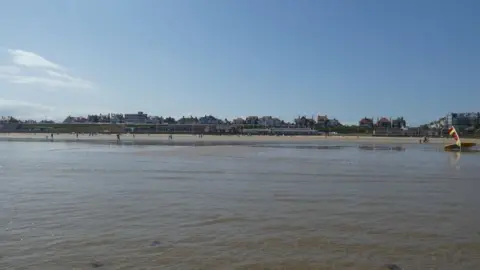Seabird poo 'main contributor' to beach pollution
 BBC
BBCSeabird droppings are the "main contributor" to pollution on an East Yorkshire beach, a study has found.
Bridlington South Beach's water quality has been rated "Poor" over the last few years, with tests showing high levels of Intestinal Enterococci and E. Coli bacteria.
Research by the Environment Agency (EA) has found "higher concentrations of seabird bacterial DNA" compared with samples taken from other beaches in the area.
The report also notes there were "significant increase in human specific bacterial concentrations", following rainfall.
As part of the investigation, a count of gulls during the summer of 2023 found an average of more than four times the number around South Beach compared with the town's North Beach, which has a water quality rating of "Good".
The report recommends measures such as discouraging people from feeding the gulls and improving bins.
Claire Campbell from the EA said: "Seagulls that are often on the beach down here are maybe the main contributor to water quality issues at this site.
"But they're not alone. When it rains we found last year that there were indicators of human DNA in the water."
The report said further investigation was needed to see if the harbour was the source of the human pollution or run off from the Gypsey Race waterway.
Adam Ashman from Yorkshire Water said: "We're not happy with storm overflows operating and impacting our bathing beaches.
"We've put forward ambitious plans to to invest in improving those storm overflows, reducing the impact they have across Yorkshire."
 DS Pugh / Geograph
DS Pugh / GeographThe beach has lost its Blue Flag status and the current EA advice is not to swim in the sea.
East Riding of Yorkshire councillor Barbara Jefferson said she wanted to "see results".
"I want everyone to come and enjoy themselves along our coast."
Listen to highlights from Hull and East Yorkshire on BBC Sounds, watch the latest episode of Look North or tell us about a story you think we should be covering here.
